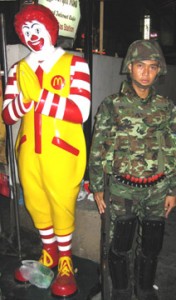WoWasis had a very interesting conversation the other day with a cameraman from the BBC. We were discussing the red shirt protest in Bangkok in May of 2010, in which several reporters and camerapersons were killed or injured while in the line of fire. We mentioned that some of the most interesting footage was shot by amateurs, rather than professionals. He replied, somewhat indignantly, “Did you ever stop to think that those amateurs were putting the lives of the professionals in peril?”
Our first response was “how?” But on second thought, the real issue is since when do major news networks feel they “own” the news to the extent that others don’t have the “right” to cover anything they damn well please? It’s easy to see how networks and press people could feel this way. For decades, they owned the expensive cameras, newspapers, and other media outlets that were virtually the only source of information. An amateur simply wouldn’t get published. And in the old days, amateurs were pretty much limited to 8mm or 16mm non-synch sound cameras. Not very sexy for broadcast media.
Today, the proliferation of inexpensive handheld cameras and “instant-press” media (the blog post you’re reading is one of those) essentially makes everyone a potential reporter/cameraperson. Yes, in often heated urban battle zones, reporters will trip over each other, especially when scrambling to avoid fire. One big difference in terms of what gets shown and reported is that amateurs can post content on the internet without limits to available space, time, or the occasional interests of advertisers or political expediencies (the image accompanying this post of a soldier standing next to Ronald McDonald is just one example of a photo that probably wouldn’t make it into the pages of a newspaper that was driving significant advertising revenue from that restaurant chain).
To the chagrin of our BBC friend, the world of media is changing, and news networks the world over are increasingly purchasing amateur footage for use in broadcasts. Other material that would have been censored in the past is now being made available to anyone with access to an internet connection. Television news programming is being more and more geared to “infotainment” rather than hard news stories, and the fact that many people are choosing to get their news from sources other than traditional print and media outlets is no longer news.
Technology has changed the face of news reporting in the space of one generation. Some folks still don’t get it.

Leave a Reply